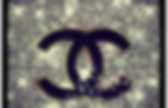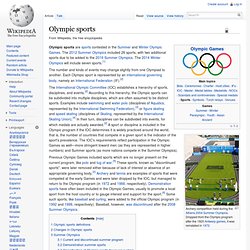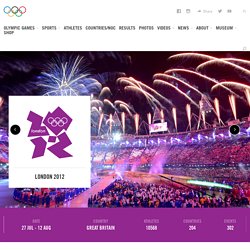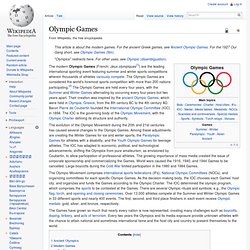

London 2012 - Official Australian Olympic Team website - London 2012. 2012 Summer Olympics. The 2012 Summer Olympics, formally the Games of the XXX Olympiad[2] and commonly known as London 2012, was a major international multi-sport event celebrated in the tradition of the Olympic Games, as governed by the International Olympic Committee (IOC).

It took place in London, United Kingdom and a lesser extent across the country from 25 July to 12 August 2012. The first event, the group stage in women's football began on 25 July at the Millennium Stadium in Cardiff.[3][4] More than 10,000 athletes from 204 National Olympic Committees (NOCs) participated.[5] It was officially started however on Friday 27 July 2012 at 0:00. Construction for the Games involved considerable redevelopment, with an emphasis on sustainability.[11] The main focus was a new 200-hectare (490-acre) Olympic Park, constructed on a former industrial site at Stratford, East London.[12] The Games also made use of venues that already existed before the bid.[13] Bidding process[edit] Development and preparation[edit] Famous Olympic Athletes. Olympic sports.
Olympic sports are sports contested in the Summer and Winter Olympic Games.

The 2012 Summer Olympics included 26 sports, with two additional sports due to be added to the 2016 Summer Olympics. The 2014 Winter Olympics will include seven sports.[1] The number and kinds of events may change slightly from one Olympiad to another. Each Olympic sport is represented by an international governing body, namely an International Federation (IF).[2] Previous Olympic Games included sports which are no longer present on the current program, like polo and tug of war.[5] These sports, known as "discontinued sports", were later removed either because of lack of interest or absence of an appropriate governing body.[2] Archery and tennis are examples of sports that were competed at the early Games and were later dropped by the IOC, but managed to return to the Olympic program (in 1972 and 1988, respectively).
Olympic sports definitions Changes in Olympic sports Summer Olympics Demonstration summer sports. London 2012 Olympics - Schedule, Results, Medals, Tickets, Venues. List of Summer and Winter Olympic Sports and Events. London 2012 Olympics - Schedule, Results, Medals, Tickets, Venues.
The London 2012 Games were centred around the Olympic Park in east London, which is the site of a number of new sports venues.

Up to 180,000 spectators a day entered the Park to enjoy the Games, making it the principal focus of Olympic activity. The main venues – the Olympic Stadium, Aquatics Centre, Velodrome and BMX Circuit, as well as the hockey, handball and basketball arenas – were easily accessible through a network of footbridges and walkways within the Park.
The Olympic Village was within walking distance of all the venues in the Park, enhancing the experience for athletes and officials. The use of other prestigious venues – such as Wembley Stadium for football, the All-England Club in Wimbledon for tennis, Lord’s Cricket Ground for archery and Horse Guards Parade for beach volleyball – was also a feature of the London 2012 Olympic and Paralympic Games. The London 2012 Games included a four-year Cultural Olympiad. Olympic Games. The modern Olympic Games (French: Jeux olympiques[1]) are the leading international sporting event featuring summer and winter sports competitions wherein thousands of athletes variously compete.

The Olympic Games are considered the world's foremost sports competition with more than 200 nations participating.[2] The Olympic Games are held every four years, with the Summer and Winter Games alternating by occurring every four years but two years apart. Their creation was inspired by the ancient Olympic Games, which were held in Olympia, Greece, from the 8th century BC to the 4th century AD.
Baron Pierre de Coubertin founded the International Olympic Committee (IOC) in 1894. The IOC is the governing body of the Olympic Movement, with the Olympic Charter defining its structure and authority. The evolution of the Olympic Movement during the 20th and 21st centuries has caused several changes to the Olympic Games. Ancient Olympics Modern Games Forerunners Revival 1896 Games Changes and adaptations.